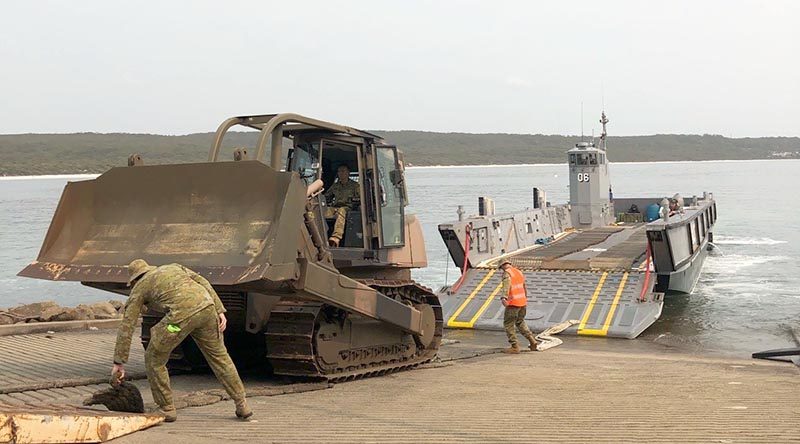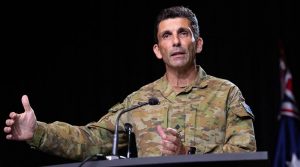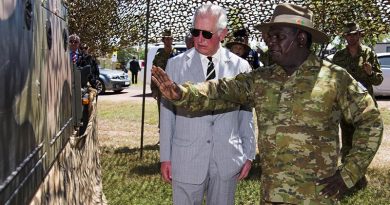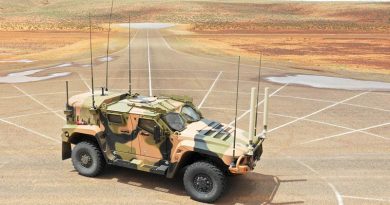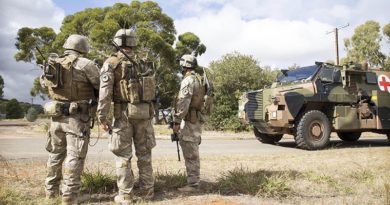Op Bushfire Assist – 14 January UPDATE

Updated at 8am 15 January 2020
Watch Major General Jake Ellwood’s
brief to media, 14 January 2020…
MAIN PHOTO: A bulldozer is landed at HMAS Creswell, Jervis Bay, from HMAS Adelaide.
RELATED STORIES: Operation Bushfire Assist 19-20
The bushfire crisis is the Australian Defence Force’s main effort.
ADF personnel have been working with state and territory authorities since September 2019 to respond to Australia’s bushfire crisis. This support will continue for as long as needed.
Around 5600 full-time and reserve personnel are providing direct support in the field, at sea, in the air and from Defence bases across fire-affected regions.
Around 2700 reservists are supporting Operation Bushfire Assist.
Three Joint Task Forces are coordinating the ADF’s effort:
- JTF 646 Victoria: Based on Army’s 4th Brigade, with support elements from across the ADF. RAAF Base East Sale is the central hub for the Defence response in southern areas.
- JTF 1110 New South Wales and the Australian Capital Territory: Based on Army’s 5th Brigade, with support elements from across the ADF. Holsworthy Barracks is the central hub for the Defence response across NSW and the ACT.
- JTF 1111 South Australia and Tasmania: Based on Army’s 9th Brigade, with support elements from across the ADF. Keswick Barracks is the central hub for the Defence response across South Australia and Tasmania.
Defence is also providing support to emergency services personnel in Western Australia to support firefighting efforts.
The Chief of the Defence Force appointed Major General Justin ‘Jake’ Ellwood is the Emergency ADF National Support Coordinator working in support of state and territory authorities.
Detailed support
Victoria – Joint Task Force (JTF) 646
Daily highlights
- A P-8A Poseidon aircraft conducted a collection mission in Mount Buffalo, Albury, Tarcutta, Talingbo, Namadgi and Shoalhaven.
- On January 14, the ADF delivered the first drop of 13 bags of mail to Mallacoota.
- On January 14, the ADF delivered 12,000 litres of water to Bairnsdale.
- On January 13, two C-130J Hercules transported 100 Papua New Guinea Defence Force members to Victoria, in preparation for their attachment to JTF 646.
Ongoing activity
- ADF presence in Mallacoota continues, along with support activities in the region.
- Continued route clearance and assessment through coastal and alpine areas, with the main effort focussed on route clearance on the Princes Highway.
- ADF presence in Mallacoota continues, along with support activities in the region.
- Support to evacuee camps, Department of Human Services recovery centres and emergency service personnel.
Air support
- ADF helicopters continue to transport fire fighters and evacuees, and provide food and equipment where needed.
- Two Australian and two Singaporean CH-47 Chinook helicopters are operating from RAAF Base East Sale to provide support to firefighting operations and humanitarian assistance to remote and isolated communities.
- Air traffic controllers are providing a flight information service at the Bairnsdale Airport to support local authorities to manage the high volume of air traffic at the airport.
- A P-8A Poseidon aircraft is regularly conducting reconnaissance flights over fire-affected areas, and the following aircraft are conducting support flights: two C-17A Globemasters from RAAF Base Amberley, two C-130J Hercules from RAAF Base Richmond and three C-27J Spartans from RAAF Base East Sale.
Health and pastoral support
- Air Force is operating a Role One Medical Facility at RAAF Base East Sale and is providing pastoral care to support Joint Task Force operations. Each JTF is be staffed with appropriately credentialed mental health professionals to provide proactive and reactive mental health support.
UAS support
- Army deployed a Small Unmanned Aerial System (Wasp) to RAAF Base East Sale on January 6 to conduct reconnaissance operations in support of JTF 646.
Mobility operations
- Engineering personnel and equipment have been made available to supplement state capabilities in clearing and reopening roads in fire-affected areas. Other tasks include removing debris from public areas and clearing fire breaks and fire trails.
Damage assessments
- Support is being provided to Victorian authorities to undertake rapid damage assessments in regional Victoria. The ADF is enhancing the search and rescue assessment capacity with additional vehicles and drivers.
New South Wales and Australian Capital Territory – Joint Task Force (JTF) 1110
Daily highlights
- A P-8A Poseidon aircraft conducted a collection mission in southern NSW and the ACT on January 13.
- On January 13, route clearance of the Monaro Highway was conducted in the Cooma region and around Batlow.
- Fodder was delivered around Batlow and Lower Bago on January 13.
- From January 14, ADF personnel are establishing distribution points in Lake Conjola, Milton, Nowra and Cobargo.
- Primary health care team support is now being offered in Tumbarumba, Narooma, Cooma, Bega and at HMAS Albatross.
- Two EC-135 helicopters conducted day and night-time fire spotting in the ACT on January 13.
- From January 13, ADF personnel are establishing a distribution point in Batemans Bay with an estimated 24 truckloads of donated goods to be distributed.
- From January 13, the ADF is assisting the Bega City Council with bridge damage assessments.
- HMAS Adelaide is operating in the vicinity of Jervis Bay.
Ongoing activity
- Two Fleetliner tanker trucks near Holbrook are providing 120,000 litres of water a day to local communities.
- Engineering clearance support is occurring in Maitland, Mudgee, Nowra and Southern Highlands.
- Army engineers continue the cutting of a containment line in the vicinity of Kangaroo Valley.
- Navy liaison officers continue liaison functions into areas such as Borona and Mont.
- Support continues around the Canberra/Tumut area with clearance, logistic support, medium and heavy plant tasks and driver support to the NSW Rural Fire Service.
- Engineer task groups are providing support throughout the state, including heavy plant work at the Bondo Forest and Eden Woodchip Mill.
- Heavy plant operations continue in support of the Department of Forestry with construction of a 70km long firebreak in Bondo State Forest.
- Army engineers commenced clearance tasks from Maitland, Mudgee, Nowra and Southern Highlands.
Air support
- A P-8A Poseidon maritime patrol aircraft has been conducting reconnaissance flights over fire-affected areas in NSW and Victoria. This aircraft is operating from RAAF Base Edinburgh, South Australia.
- MRH-90 Taipan, MH-60R Seahawk and EC-135 helicopters continue fire mapping, surveillance, and search and rescue operations supporting the NSW Wales Rural Fire Service throughout the Hunter, Greater Sydney, Illawarra and Southern regions.
- Four Australian Army MRH-90 helicopters and crew are providing support out of Luscombe Airfield at Holsworthy.
Recovery operations
- The ADF is providing personnel and equipment to undertake initial recovery tasks as identified and assessed by the NSW Government, based on advice from specialist ADF advisers. These tasks are in Tamworth, Wollondilly, Nowra, Mudgee, Maitland and Wingecarribee.
- Army and Air Force engineering teams are staging out of HMAS Harman ready to support the Snowy Mountains and Riverina areas.
Health and pastoral support
- Army has established a Role One Medical Facility at Holsworthy Barracks and is providing pastoral care to support JSF operations.
Liaison
- NSW Police has assigned Assistant Commissioner Michael Willing to Joint Task Force 1110 to strengthen communication and coordination with the ADF
- Army support teams have been liaising with communities in Wagga Wagga, Tumut, Holbrook, Cooma, Jindabyne, Tumbarumba, Jingellic, Bega, Bermagui and Eden.
South Australia and Tasmania – Joint Task Force (JTF) 1111
Daily highlights
- From January 14, two CH-47 helicopters are supporting recovery tasks and fodder distribution on Kangaroo Island. The first priority is to distribute hay bales.
- ADF personnel are assisting farmers to save about $120,000 of garlic crops for local farmers on Kangaroo Island.
- ADF personnel are helping with property clean-up for residents near Cudlee Creek (around Adelaide).
- On January 13, two Australian Army CH-47 Chinook helicopters relocated from RAAF Base East Sale to RAAF Base Edinburgh to provide support to Kangaroo Island.
- On January 12, a RAAF C-17A transport aircraft flew passengers and cargo to Kangaroo Island.
Ongoing activity
- The NZ Defence Force engineer water treatment capacity located at Vivonne Bay is providing up to 12,000 litres of fresh water in cooperation with SA Water.
- Defence personnel on Kangaroo Island are conducting further livestock disposal, fire containment tasks, firebreak preparation and recovery of civilian vehicles from the Parndana region.
- ADF teams are assisting with repairs to farms and infrastructure, roadside maintenance, clearing fallen trees and transporting up to 20,000 litres of water for local farms and livestock in the Adelaide Hills.
- A P-8A Poseidon aircraft from RAAF Base Edinburgh is undertaking reconnaissance of fire grounds in Kangaroo Island, Gippsland, Shoalhaven, Alpine regions and the Hume Highway.
- Army support teams are disposing of deceased livestock and wildlife on Kangaroo Island. The teams are also assisting with fire containment tasks, equipment provisions, road clearance and fence repairs, removing fallen trees and replacing roadside markers.
- Army catering staff are assisting in the provision of meals for South Australia Country Fire Service personnel.
- Support continues to be provided to SES and CFS in the vicinity of Kingscote Airport.
- A Civil-Military Cooperation Liaison Officer team is helping coordinate tasks for the greater Adelaide area.
- Army reservists from the 10th/27th Battalion, Royal South Australia Regiment, and a convoy of Army vehicles with supplies are on Kangaroo Island for initial recovery efforts.
- ADF pastoral care and mental health support personnel are on Kangaroo Island to help ADF personnel and members of the community. A Primary Health Team was established at the Kangaroo Island Ferry Terminal in Penneshaw to treat any evacuees.
Defence base support
- Due to the bushfire crisis, Defence has opened bases from Brisbane to Adelaide for the use of people needing short-term evacuation assistance. For more information call 1800 333 362.
- The following bases are prepared to provide accommodation to evacuees if needed: RAAF Base East Sale, RAAF Base Williams, Latchford Barracks, RAAF Base Edinburgh, RAAF Base Richmond, RAAF Base Williamtown, RAAF Base Wagga, HMAS Harman.
The following bases are providing additional support:
- RAAF Base East Sale is supporting Defence aircraft providing emergency response.
- RAAF Base Richmond is providing airbase access and support for Large Air Tanker and spotter aircraft.
- RAAF Base Wagga is providing refuelling support.
- HMAS Albatross is providing accommodation and meals for RFS personnel.
- Marrangaroo Training Area has area has been made available for RFS operations.
Reserve call out arrangements
- Call out of reserves has been authorised by the Governor-General, as part of the wider call out of the ADF.
- The call out is focused on 1st, 3rd, 6th, 7th and 17th Brigades and reservists from the 2nd Division, specifically the 4th, 5th and 9th Brigades, who are forming the basis of the three Joint Task Forces.
- The call out will involve up to 3000 reservists and commenced progressively from January 5.
- For more information about the call out, visit the Defence Reserves Support website.
Future support
- Defence is facilitating the transport of additional fire retardant from the United States using our own air lift capacity, with assistance from international partners.
International assistance
- The New Zealand Defence Force and the Singapore Armed Forces are providing support through military assets and personnel. All Singapore Armed Forces and New Zealand Defence Force elements are now integrated into the operation.
- 100 light engineers from the Papua New Guinea Defence Force arrived in Australia on January 13 via C130-J Hercules. They will stage in Puckapunyal in readiness to support the ADF contribution to the Australian national bushfire response.
- Defence has accepted the Republic of Fiji’s offer to provide a platoon of engineers, who will work alongside ADF personnel operating out of East Gippsland.
- Defence has received additional offers from other international partners and expects these to be progressively developed as need and circumstances evolve.
Concluded support
Since September 5, 2019, Defence has provided the following support to firefighting efforts:
- The Australian Defence Force provided support to firefighting efforts near Canungra in south-east Queensland from September 5-21, 2019. This assistance included support to firefighting helicopter operations, the provision of accommodation and meals to firefighters, geospatial intelligence for fire mapping, and support to the incident control centre.
- From November 8 to February 1, the Royal Australian Air Force is providing contingency airlift support to move large groups of firefighters and their equipment between interstate locations.
- A RAAF 737 Boeing Business Jet transported ACT Rural Fire Service firefighters from Canberra to Port Macquarie on November 8.
- A RAAF C-130J aircraft transported firefighters and their equipment from Adelaide to Port Macquarie on November 9.
- A RAAF C-130J Hercules aircraft transported firefighters and their equipment from Hobart to Port Macquarie on November 10.
- A RAAF C-130J Hercules aircraft transported firefighters and their equipment from Essendon and Mildura to Armidale on November 12.
- A RAAF KC-30A multi-role tanker transport aircraft transported 150 firefighters and their personal equipment from Melbourne Airport to Sydney Airport on November 14.
- Two RAAF KC-30A multi-role tanker transport aircraft transported 258 firefighters and their personal equipment from Sydney Airport to Melbourne Airport on November 15.
- A RAAF C-17A Globemaster aircraft transported 165 firefighters and their equipment, using two flights, from Melbourne to Coffs Harbour on November 17.
- A RAAF C-17A Globemaster aircraft transported 130 firefighters and their equipment from RAAF Base Richmond to Melbourne. The same aircraft then transported an additional 130 firefighters and their equipment from Coffs Harbour to Melbourne on November 18.
- A RAAF C-17A Globemaster aircraft transported 130 firefighters from Melbourne to RAAF Base Richmond on November 19.
- A RAAF C-130J Hercules aircraft transported 140 firefighters and their equipment from Melbourne to Coffs Harbour on November 20.
- A RAAF C-130J Hercules aircraft transported 167 firefighters and their equipment from Coffs Harbour to Melbourne on November 21.
- A RAAF C-130J Hercules aircraft transported 108 firefighters and their equipment from Coffs Harbour to Melbourne on November 24.
- On November 18, 21 and 22, Army supported Queensland Fire and Emergency Services helicopter operations at Borneo Barracks, near Toowoomba.
- From November 11-13, Singleton Army Barracks provided accommodation and catering support to about 200 firefighters from the Victorian Country Fire Authority.
- From November 12-14, a Navy and Army aviation liaison capability worked within the NSW Rural Fire Service State Operations Centre to ensure ADF air support was appropriately coordinated.
- From November 12-14, two MRH-90 Taipan helicopters from the Navy and two S-70 Black Hawk helicopters from the Army provided movements for Rural Fire Service strike teams and, if required, the rescue of civilian personnel.
- From November 12-13, the Navy provided two MH-60R Seahawk helicopters to fly night missions from Sydney and Coffs Harbour to facilitate the operation of Rural Fire Service air observers. Two EC135 helicopters continued support on November 14.
- Two EC135 helicopters from the Navy and two S-70 Black Hawk helicopters from the Army flew in support of NSW Rural Fire Service impact assessments on November 14.
- ADF personnel from Kokoda Barracks, Canungra, and the 7th Brigade, Brisbane, provided engineering support to assist Queensland Fire and Emergency Services to clean up fire breaks near Beechmont.
- From November 12-13, Kokoda Army Barracks, Canungra, provided evening meals for 40 firefighters.
- On November 14, RAAF Base Pearce provided support to aerial firefighting aircraft from the Western Australian Department of Fire and Emergency Services under DACC arrangements.
- From November 12-16, RAAF Base Williamtown provided refuelling and water re-supply support to a Large Aerial Tanker from the NSW Rural Fire Service.
- From November 13-17, Army Tiger Armed Reconnaissance Helicopters supported Queensland Fire and Emergency Services conducting night fire mapping. On November 17, a Tiger provided support to search for isolated persons in a high-threat fire area. Queensland Fire and Emergency Services safely recovered the individuals.
- From November 13-23, RAAF Base Richmond provided accommodation and catering support for varying numbers of between 150 and 300 firefighters, as well as providing workshop/maintenance hangars for up to 50 fire appliances and support vehicles.
- On November 18, the 7th Brigade provided a platoon to support Queensland Police and Queensland State Emergency Services to search for a missing person around Mount Glorious, Queensland. The missing person was located on the morning of November 18.
- From November 18-19, the Army’s Borneo Barracks near Toowoomba established a helicopter-landing site, overnight parking and refuelling capability for firefighting and support to civilian rotary-wing aircraft.
- From November 20-21, two Australian Army MRH-90 Taipan helicopters conducted night fire mapping in south-east Queensland in support of the Queensland Fire and Emergency Services.
- On November 21, a NSW Rural Fire Service Large Aerial Tanker was refuelled at RAAF Base Edinburgh after a mission was completed in South Australia.
- From November 22-27, Army provided logistics support to the Queensland Fire and Emergency Services incident control centre, hosted on Borneo Barracks, Cabarlah.
- On November 26, RAAF Base Gingin provided 18,900 litres of water to two water bombers fighting a fire in the vicinity of Yanchep.
- From November 26 to December 21, Army provided NSW Rural Fire Service with ground logistic support for the movement of vehicles, stores and equipment in Wauchope.
- From December 2-6 and December 10-11, Army provided rotary-wing support to the NSW Rural Fire Service from Holsworthy Barracks to support search and rescue and firefighting intelligence.
- On December 3-4, HMAS Albatross was used to provide catering and accommodation for the NSW Rural Fire Service at Naval Air Station Nowra.
- On December 4, RAAF Base Pearce provided 12,000 litres of water to two water bombers fighting fires in the vicinity of the City of Swan, Perth.
- On December 9, ADF Joint Operations Support Staff-Victoria personnel were established in the Victorian Government State Control Centre following State Tier 3 Red notification for forecast catastrophic fire conditions.
- From December 10-11, a Navy helicopter provided support to the the NSW Rural Fire Service for 24 hours to fly day and night missions from the Naval Air Station Nowra to facilitate the operation of Rural Fire Service-trained air observers.
- On December 15, RAAF Base Pearce provided support to aerial firefighting aircraft from the Western Australian Department of Fire and Emergency Services under DACC arrangements. Some 60,000 litres of water and 17,870 litres of fuel was provided for the firefighting efforts in the vicinity of Collie and 18,000 litres was provided for firefighting efforts in the vicinity of Yanchep.
- On December 16, RAAF Base Pearce provided support to aerial firefighting aircraft from the Western Australian Department of Fire and Emergency Services. About 3000 litres of water was provided to fight a fire in the vicinity of Brand Highway.
- From December 19-23, two Navy helicopters operated from Nowra to provide daytime search and rescue, as well as night-time fire mapping and support missions to the NSW Rural Fire Service.
- On December 20, support was provided from RAAF Base Edinburgh, South Australia, to refuel two Large Aerial Tankers fighting fires near Cudlee Creek and Munno Para. This support continued on the morning of 21 December.
- From December 20-23, an additional Joint Operation Support Staff Liaison Officer was deployed to the South Australia Country Fire Service Incident Management Team at Mount Barker to provide direct advice.
- On December 21-22, RAAF Base Williamtown provided fuel and movements support for two NSW Rural Fire Service fire scanner aircraft under a standing DACC 4 Memorandum of Understanding request.
- From December 27-30, 2019, 14 ADF personnel deployed within NSW Rural Fire Service incident management teams and are now finalising reports detailing possible options for ADF support during initial recovery operations after the bushfire threat has passed. Defence is expecting a request for assistance from New South Wales authorities and is preparing forces for such a request.
- On January 3, 2020, two Navy ships evacuated about 1100 isolated persons from Mallacoota.
- More than 170 people were evacuated by rotary and fixed wing aircraft on January 5.
- The ADF delivered 18,000 litres of fuel to Omeo for generators powering the town on January 6-7.
- Working with state authorities, Defence contacted 18 cut-off communities, flying in emergency food, water, fuel and medical supplies as required. Eight communities were visited on January 5, with a further 10 visited on 6 January.
- On January 5, HMAS Choules (crew of 179) arrived in Western Port with about 1100 evacuees. On January 6, Choules returned to Mallacoota to unload diesel fuel and a fuel management team to sustain the operation of generators providing electricity to Mallacoota.
- 400 stretchers were provided to the evacuation centres at Moruya and Batemans Bay.
- A damage assessment team was deployed to Kangaroo Island on January 5, comprising two high-clearance 4WD vehicles capable of carrying a driver and three staff.
- Army personnel have assisted in the construction of a State Emergency Services camp, rescued injured wildlife and distributed bottled water and bulk water to Kingscote Airport.
- From January 6, a Striker vehicle and crew were made available to support NSW Rural Fire Service helicopter ‘hot-refuelling’ at Picton Showgrounds.
- On January 6, JTF 646 commenced redistribution of forces in the northern (Alpine) and southern (Coastal) areas of operation, in order to ensure both Army Support Battalions are force-assigned and capable to undertake a variety of support tasks.
- On January 7, JTF 646 commenced the preparation of a staging area for about 100 international fire-fighters in the vicinity of Omeo.
- On January 7, HMAS Choules embarked 280 people from Mallacoota for evacuation to HMAS Cerberus. The ship also delivered stores and emergency services vehicles to Mallacoota.
- A fuel tanker was sent to the Milton showground.
- On January 7, support flights were undertaken to relieve 20 firefighters between Port Macquarie to Merimbula.
- As of 8 January, a plan has been finalised to support the Department of Agriculture in dealing with deceased livestock.
- On January 8, Army engineers staged forward to Canberra.
- On January 8, Army engineers moved into Eden with a focus on supporting efforts to deal with the woodchip fire.
- On January 8, Army engineers created fire breaks in Kangaroo Valley, cleared tracks around Nowra and provided route clearance in Wollemi National Park.
- Logistics Support Detachments were deployed to provide support in Glen Innes, Wilberforce, Tamworth, Tumut and Moruya. Food and water was delivered to Rural Fire Service personnel in areas around Tumut. Logistics advice was provided to the Snowy Mountain Council food distribution point.
- From January 9-11, interagency teams conducted route clearance tasks north of Bairnsdale, hay bales and fodder were moved to key locations in regional Victoria, engineer support was provided to Benalla and Ovens, and engineers undertook route clearance tasks along the Victorian coast.
- On January 0, C-27J Spartan operations in support of Mallacoota continued with seven sorties from East Sale with cargo delivered and evacuees flown out.
- On January 9, Army engineers completed a route clearance in Bulga.
- From January 9, an engineering reconnaissance team operated out of the Incident Control Centre at Moruya after linking with the Rural Fire Service in Mogo.
- A Primary Health Team relocated to Eden from Batemans Bay on January 9.
- New Zealand Army engineers arrived on Kangaroo Island on January 9 to begin support operations.
- From January 9, ADF teams on Kangaroo Island were ready to support the evacuation of Vivonne Bay if required. Army engineers assisted in the clearance of roads in this area.
- From January 10, Military Police conducted security in Batemans Bay in support of the distribution centre at Mackay Park.
- On January 10, air movement of stores and personnel continued to critical locations in Cabbage Tree, Bairnsdale and Chandlers Creek.
- A C-17 aircraft conducted a resupply flight from RAAF Base Edinburgh to Kangaroo Island on January 10.
- From 10-11 January, Army personnel provided water and assisted in fire preparations at the Parndana Wildlife Reserve.
- On January 10, a Primary Health Care team was established at the ferry terminal in Penneshaw to treat potential evacuees.
- A Primary Health Care Team staged at Snowy Hydro Plant Centre on January 12.
- A Singaporean CH-47 Chinook helicopter conducted a passenger transfer to Melbourne on January 13.
- Passengers, diesel fuel and fire supporting equipment were transported to Mallacoota by a C-27J Spartan aircraft on January 12.
- Passengers and machinery were flown to RAAF Base East Sale on a C-17A aircraft on January 12.
- From January 12-13, an Army reconnaissance team using Protected Mobility Vehicles undertook route clearance and assessment between Orbost and Mallacoota.
- Engineers established their Task Group Headquarters on January 12 at Tumut to support the State Emergency Operations Centre.
- An engineer task group was also formed on January 12 to support operations around Bega.
- A transport section was established at Narooma on January 12 to improve logistics flows.
- On January 12, a Navy clearance dive team and Army engineers assisted in the recovery of the downed civilian helicopter from the Ben Boyd Reservoir near Eden. The dive team played a key role in resurfacing the aircraft, allowing an ongoing investigation by the civil aviation authorities.
- On January 12, Army delivered catering assets in support of the Country Fire Service on Kangaroo Island.
- On January 12, a RAAF C-17A transport aircraft flew passengers and cargo to Kangaroo Island.
Overview
- The ADF is not trained, equipped or certified to undertake ground-based or aerial bush firefighting and does not get involved in the direct act of fighting bushfires outside Defence property.
- The state and territory governments have primary responsibility for the protection of life, property and the environment, and for coordinating and planning emergency responses or recovery actions in disaster-affected areas within their jurisdiction.
- The ADF is able to support the states and territories, within resource limitations, in accordance with Defence Assistance to the Civil Community arrangements as part of a whole-of-government response, where state or territory capacity or resources do not exist, or are not available in sufficient time.
- Defence has arrangements in place to call out ADF reservists if required to supplement regular personnel.
- Defence is working with Emergency Management Australia to identify what other ADF capabilities, such as aviation, logistics, transport, engineering and accommodation support can be provided to aid firefighting efforts in eastern Australia.
- Defence is postured to provide further airlift support and is prepared to provide assistance in areas such as aerial fire reconnaissance, logistical support (ground transport, accommodation, meals etc.) and engineering (field work) upon request from state or territory governments.
.
.
.
.
.
.

.
.

